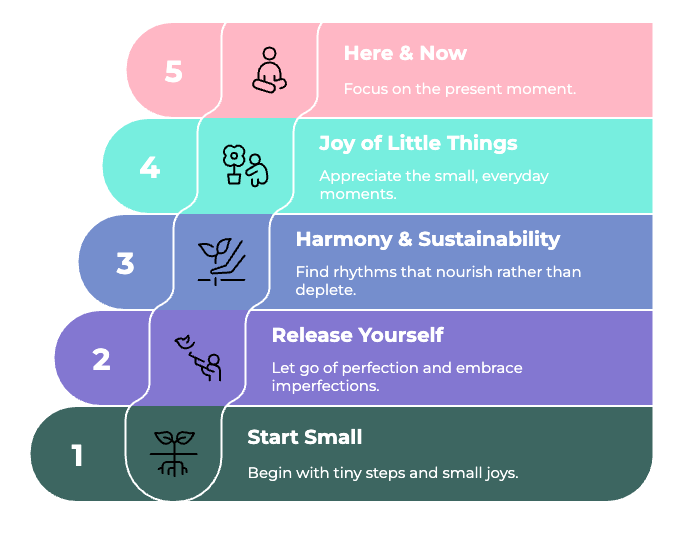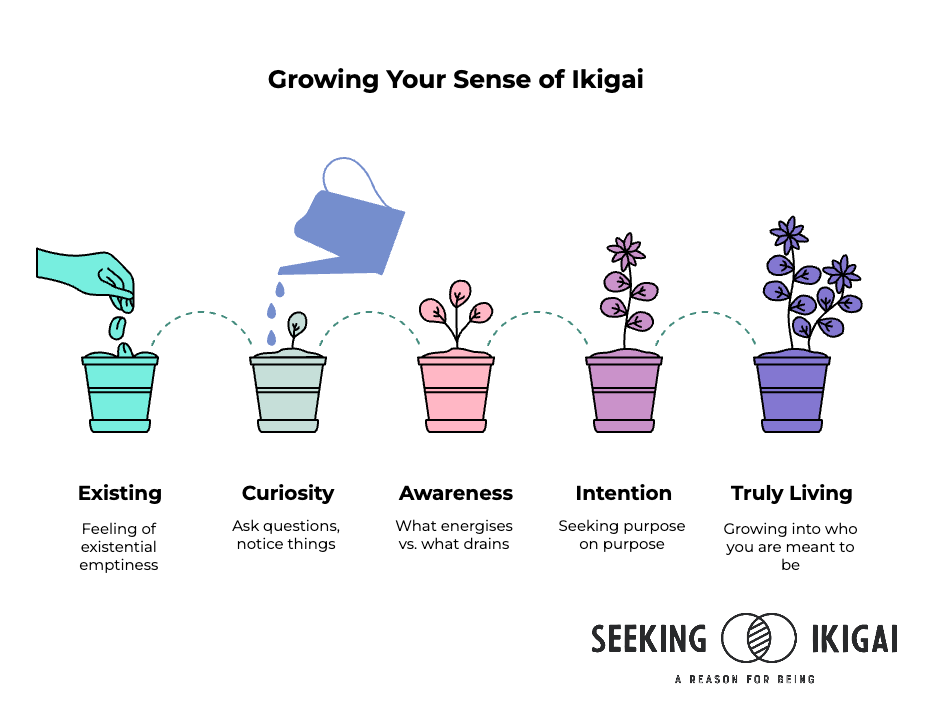What actually is ikigai?
Seeking purpose on purpose
🌸 ikigai 生き甲斐 is a reason for being, your purpose in life - from the Japanese iki 生き meaning life and gai 甲斐 meaning worth 🌸
I used to think purpose was something you stumbled upon by accident. Like finding a tenner in an old coat pocket or the perfect song playing on shuffle.
Turns out, that's bollocks.
How many evenings sat scrolling Netflix and drinking wine? Life happening to me, buffeted by external stuff and too much nonsense…. days blurring into weeks, coping by consuming (scrolling, bingeing, numbing) a LOT more than creating, trying to drown out the voices inside telling me I wasn’t really living, just surviving…. the gnawing feelings becoming questions I couldn’t ignore > When had I surrendered control over my own life? And more importantly, how could I take it back? What actually matters to me?
Purpose… real, sustainable, joy-sparking purpose… happens when you seek it intentionally. When you stop waiting for lightning to strike and start paying attention to the gentle tugs your soul keeps sending.
That's where ikigai (ee-kee-guy) comes in. Not the Western version you've probably seen (four overlapping circles promising to solve your career crisis), but the real thing. The Japanese philosophy that's been quietly giving words to people find meaning for centuries, long before it was turned into productivity porn.
If you're here because you're tired of just existing, because one year feels indistinguishable from the next and you keep thinking "surely there's more to life than this", well, you're in exactly the right place.
What ikigai actually is (and isn't)
Let's start with what ikigai isn't, because chances are you've seen the diagram. Four circles; what you love, what you're good at, what the world needs, what you can be paid for. Find the magical intersection and voilà, life sorted.
That diagram isn't actually about ikigai. When drawn correctly (ahem, did you know that 4 circles doesn’t show all the overlaps??!, it is mathematically incorrect!!) it's a bloody brilliant tool for thinking about meaningful work (I say that hatarakigai (work worth doing) is a better Japanese word to use for it though), but it's not a picture of what ikigai means.
Real ikigai is both simpler and more profound. The word itself breaks down beautifully; iki (life) and gai (worth). Your reason for being. Things that make you glad to wake up each morning.
In Japan, ikigai isn't about grand career pivots or finding your one true calling. It's about presence. It's about finding joy in small things. It's about being fully here, right now, with what you have.
Your ikigai might be the way morning light hits your coffee cup. The satisfaction of a perfectly organised bookshelf. The warmth in someone's voice when you help them solve a problem. The quiet contentment of knowing you're exactly where you're supposed to be.
Ikigai in real life? It’s my neighbour who carefully tends her window-box herbs every morning, smiling quietly as she trims the basil. It’s my mate who patiently teaches his daughter to ride her bike after work, day after day, cheering at every wobbly milestone. It’s me, realising that crafting these essays fills me with quiet delight, even if nobody ever reads them.
It's not always dramatic. It doesn't need to change the world. It just needs to matter to you.
The five pillars that hold up a meaningful life
Neuroscientist Ken Mogi, who wrote "The Little Book of Ikigai" breaks it down into five pillars.
Think of these as the foundational elements that support a life worth living;
Starting Small - You don't need a complete life overhaul. One tiny step, one small joy, one moment of presence. That's enough to begin.
Releasing Yourself - Stop trying to be perfect. Stop waiting until you're "ready". Your messy, weird, imperfect self is exactly who needs to start this journey.
Harmony and Sustainability - This isn't about grinding harder. It's about finding rhythms that nourish rather than deplete you. Work that enhances life rather than consuming it.
The Joy of Little Things - That perfectly ripe strawberry. A child's laugh. The satisfaction of crossing something off your list. Ikigai lives in these moments as much as in grand achievements.
Being in the Here and Now - Not yesterday's regrets or tomorrow's anxieties. Right here. Right now. This breath. This moment. This choice.
Not having all the answers but being present enough to notice the questions that actually matter.
Why this matters more than ever
We're living through a time when traditional career paths are shifting rapidly, when AI is reshaping work, when the old promises about education and hard work leading to security feel increasingly hollow.
I'm learning through journeying from burnout to genuine purpose, that when you understand your ikigai directions and drivers, external changes become less threatening. You're not clinging to a job title or industry, you're rooted in something deeper.
Plus, and this might sound odd, but I reckon ikigai awareness is our best defence against the "ikigai risk of AI", the danger that as machines take over more tasks, we may start to feel useless and forget what makes us uniquely human. When you're connected to your reason for being, you can partner with technology rather than compete against it.
Your ikigai can't be automated. It's the most future-proof thing you possess.
Worried you're doing it wrong? You're not alone. You might wonder if you're too busy, too tired, or too stuck to even start. Maybe you think purpose is reserved for the lucky few, or worry your ikigai thinking isn't "big enough" or "important enough"... ikigai isn't a performance or a contest, it's a gentle, deeply personal exploration. Struggling to start, doubting yourself, or feeling lost sometimes isn't a flaw, it's just part of being human.
Where to start (without overwhelming yourself)
Right, so you're convinced ikigai matters. Where do you actually begin? Not with a life audit or personality test or dramatic gesture (well, you can do those things too, depending on how many spoons you have at present of course *grin* and I will be sharing workbooks and more practical processes for this soon, follow/subscribe/comment if that’s what you are looking for and it’ll spur me on to speed up production!).
Start with curiosity. Start with one small question; "What made me feel most alive this week?"
Maybe it was explaining something complex in a way that finally clicked for someone. Maybe it was the quiet satisfaction of organising a chaotic drawer. Maybe it was the moment you made someone laugh when they needed it most.
These aren't random feelings, they're breadcrumbs leading toward your ikigai.
Grab any notebook (doesn't need to be fancy, although I hope to be attracting more stationery nerds into my life so we can talk about how gorgeous pens and notebooks are hehe) and just... notice things.
What energises you versus what drains you? What would you do even if no one was watching? What problems do you find yourself thinking about in the shower?
Not because you need to immediately turn these into careers, but because awareness is the first step toward intention. You can't find purpose on purpose if you don't know what you're looking for.
The journey, not the destination
I’ve long loved the phrase ‘happiness is a way to travel not a destination’, it’s even the number one thing on my personal manifesto, so why didn’t I instinctively apply that same logic to seeking ikigai initially?
I wish someone had reached me with messages like this when I was drowning in a particular flavour of existential emptiness, made me see that seeking ikigai also isn't about arriving somewhere specific and then you’re done. It's about becoming the kind of person who notices meaning when it appears.
Some days your ikigai will feel crystal clear. Other days you'll wonder if you made the whole thing up. Both are completely normal. Purpose isn't a permanent state, it's also a practice.
The beautiful thing about this philosophy is that it can meet you wherever you are. Burned out in corporate? Ikigai. Stay-at-home parent feeling invisible? Ikigai. Recent school leaver with no clue what's next? Still ikigai.
Because ikigai isn't about what you do. It's about how present you are while you're doing it. How intentional. How alive.
Your invitation to begin
I started writing about ikigai because I was desperate to understand it myself. Nearly two years and 85+ essays later, I'm still learning. Still noticing new connections. Still having moments where everything clicks into place and others where I feel a little lost.
That's the point, though. The seeking itself becoming a facet of your reason for being.
Curiosity is one of the most important skills to have.
So here's my gentle nudge to you to not wait until you're ready. Don't wait until you have more time or clarity or courage. Start exactly where you are, with exactly what you have.
Pick up a pen. Ask yourself one small question. Notice one tiny joy. Share it with us in the comments to connect.
See what unfolds.
I know this might feel like yet another thing to add to your impossible list, but ikigai isn't about adding more, it's about noticing what's already there.
When you start seeking purpose on purpose, life has a way of revealing magic you never knew was there. Not always in dramatic ways, but in the quiet moments when you realise you're growing into exactly who you're supposed to be, doing exactly what matters.
That changes everything.
Sarah, seeking ikigai xxx
PS - Please do share a tiny joy in the comments, I’d SO love to hear from you and connect…
… and if any of this resonates and you want to explore further, you'll find heaps more in my other essays that I’ve linked throughout this post… here are a few others that really matter to me too; on bullet journaling your way to purpose, navigating AI with intention, and why work worth doing matters so much.
But honestly? The best next step is just to start noticing. Start asking. Start seeking.
PPS - ✍️ Bullet Journal Reflection Question:
"Looking at this past week, which tiny moments made me feel most deeply alive, even if they seemed insignificant at the time?"
… then when you have done that you can take a pic and attach it to Claude or ChatGPT and ask ..
🌟 AI Prompt:
"What are five subtle ways I could introduce more moments of ikigai and meaning or purpose into my daily routine, based on the small joys I've noticed lately?"
PPPS – 🎶 Soundtrack for your ikigai journey this week; "One Day Like This" by Elbow.
Because ikigai is exactly about noticing and cherishing those rare, beautiful days… the ones where you wake up and realise that even the smallest moments are precious, vibrant, and brimming with purpose. This song feels like sunlight pouring through clouds, it invites us to open our eyes wide, appreciate what’s right in front of us, and remember that one perfect day (or one perfect moment) can make all the difference.
Give it a listen and let it lift you gently into noticing your own quiet joys






I have been preparing a piece on this too. <3
Such a thoughtful and hopeful piece, Sarah.
So much of the modern conversation around purpose feels inflated: big moves, bold pivots, pressure to turn everything into a vocation! But your framing brings it back to noticing, which feels more accessible & sustainable.
I, too, am a great believer that meaning, rather than being a destination, is more of a practice of attention :)